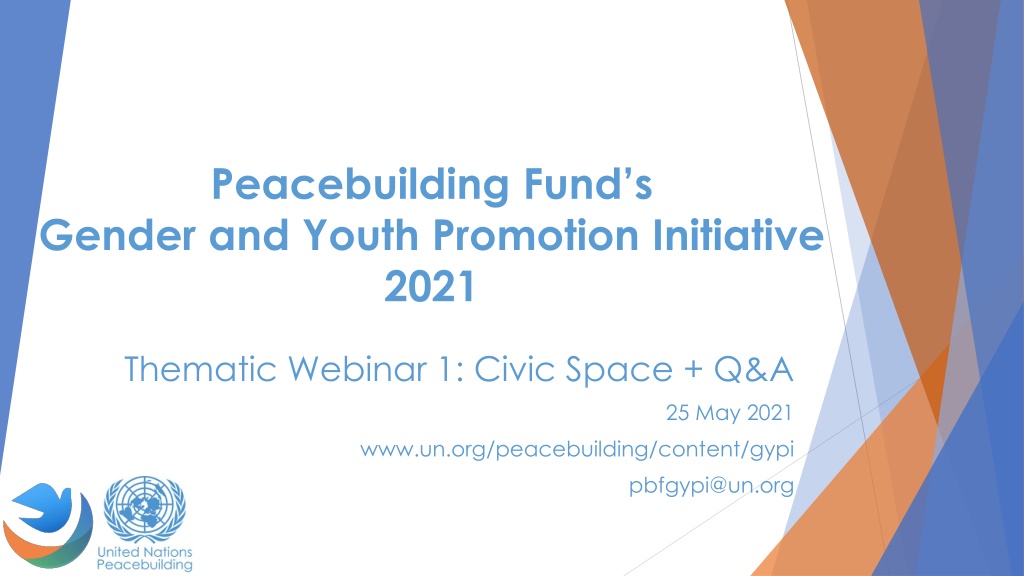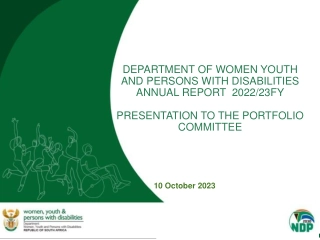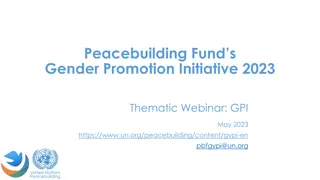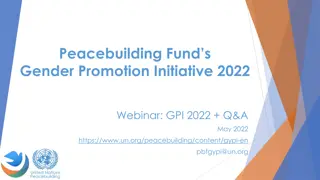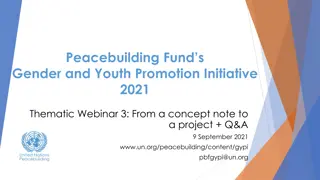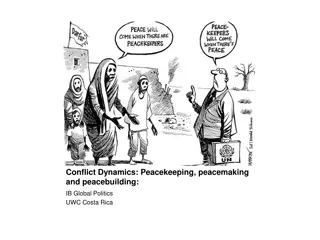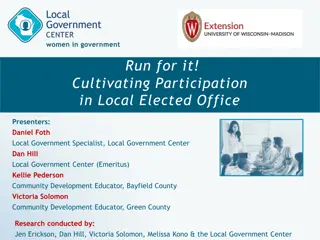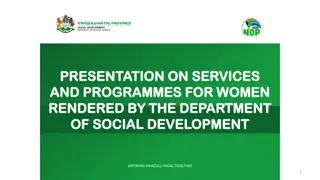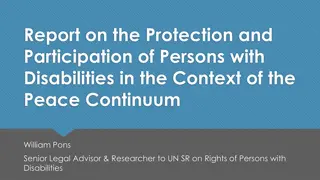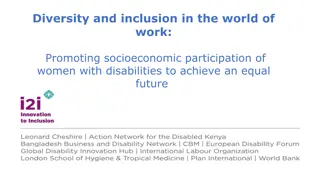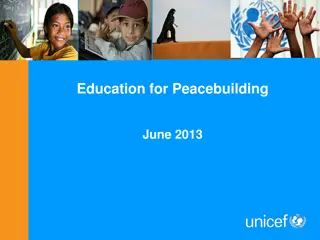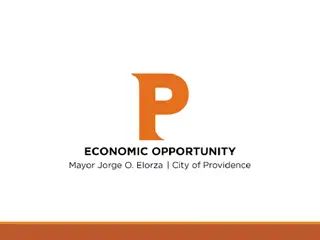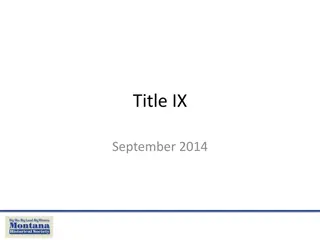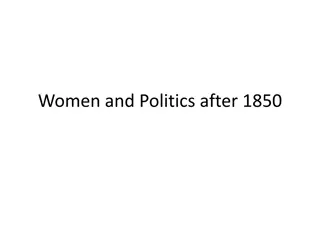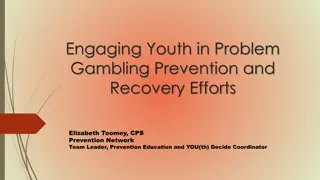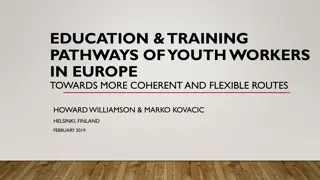Promoting Women and Youth Participation in Local Peacebuilding - GYPI 2021
The Gender and Youth Promotion Initiative 2021 focuses on promoting meaningful participation of women and youth in local peacebuilding efforts, emphasizing civic space, mental health, and psychosocial well-being. It highlights frameworks such as UNSCR 1325 and 2250, debunking stereotypes and emphasizing the importance of engaging women and youth in peacebuilding processes. The initiative also underscores the significance of civic space in public affairs as a fundamental human right for better policy-making and societal progress.
Download Presentation

Please find below an Image/Link to download the presentation.
The content on the website is provided AS IS for your information and personal use only. It may not be sold, licensed, or shared on other websites without obtaining consent from the author. Download presentation by click this link. If you encounter any issues during the download, it is possible that the publisher has removed the file from their server.
E N D
Presentation Transcript
Peacebuilding Funds Gender and Youth Promotion Initiative 2021 Thematic Webinar 1: Civic Space + Q&A 25 May 2021 www.un.org/peacebuilding/content/gypi pbfgypi@un.org
Overview GYPI 2021 Relevant Frameworks Key Terminology Civic space Participation, Promotion and Protection Highlighted areas Land rights, Indigenous peoples rights and Environmental issues Engaging and consulting with women and youth Q&A
GYPI 2021 Thematic Focus This year's GYPI will focus on: Promoting meaningful participation of women and youth in local peacebuilding For the purpose of this call, local peacebuilding is defined as peacebuilding efforts focused on the community or sub-national level. Proposals in two areas will be prioritized: Promotion and protection of civic spaces, notably regarding land, indigenous peoples and environmental issues: 1. Promotion and strengthening of mental health and psychosocial well- being for women and youth as part of local peacebuilding processes 2.
WPS and YPS frameworks Women, Peace and Security UNSCR 1325 (2000) and others on WPS Youth, Peace and Security UNSCR 2250 (2015) and others on YPS Key messages Deconstructs stereotypes and myths perceiving young men as threats and young women as victims have led to counter- productive policy panics . Gender does not equate women. It is also about power relations between men and women. Different impacts of conflict and peacebuilding on people of different genders and which gender norms or behaviors could be challenged or enhanced to promote peace. Stresses that the vast majority of young women and men are peaceful and are indispensable allies for peace and security. Emphasizes that when investments are made to support the resilience of youth and their contributions to peacebuilding, societies may reap a peace dividend. Women should not be viewed as passive victims without agency or potential for peacebuilding.
Civic space Participation in public affairs is a fundamental human right and an underutilized tool for better policy making. It deepens our understanding of issues and helps identify better solutions. It ensures that concerns are heard, reducing social tension and preventing violence. It leads to a greater sense of ownership, allowing effective implementation. It can be the difference between progress and disarray. UN Secretary-General CHECK OUT THE NEW UN SYSTEM-WIDE GUIDANCE NOTE ON CIVIC SPACE AT: https://www.ohchr.org/EN/Issue s/CivicSpace/Pages/UNRoleCivi cSpace.aspx 6
Civic space in SGs CALL TO ACTION Design [ ] mechanisms to: (i) positively engage with interlocutors to promote and protect civic space; (ii) respond to undue restrictions on civic space; and, (iii) protect the space for different stakeholders to express their views. Review and strengthen United Nations tools that aim to empower civil society, protect civic space and encourage participation by all groups in democratic processes. Ensure that Resident Coordinators, UN Country Teams and heads of United Nations peace operations develop partnerships with civil society organizations to contribute to an enabling environment for civic space, including for women s organizations and women s rights defenders. Increase UN support at field level for the promotion of laws and policies that protect the right to equal participation and civic space, including a free and independent media a foundation of open, democratic societies and most critical at a time when citizens demand accountability Increase UN support to Member States at field level for the development of protection mechanisms for human rights defenders and environmental activists, particularly young people, women and girls 9
Declaration on human rights defenders adopted by the UN General Assembly in 1998 10
3 Ps for better civic space Actively PROMOTE civic space, including civil society participation in national decision- making processes PROMOTION Ensure inclusive, equal and diverse civil society PARTICIPATION PROTECTION PARTICIPATION PROTECT civil society actors at risk, including partners and participants 11
Entry points at country-level STRENGTHEN PARTNERSHIPS BETWEEN UN and CIVIL SOCIETY throughout the UN s programming cycle across issues (development and peace) JOINTLY CONDUCT ANALYSIS of civic space trends and challenges and STRATEGIZE TOGETHER on how to remove key obstacles COORDINATE TO IMPROVE PROTECTION for those who speak up strengthen networks and state-based protection mechanisms for ALL actors INVEST IN MEANINGFUL PARTICIPATION CHANNELS at different levels INTEGRATE a CIVIL SOCIETY ENGAGEMENT component in all support to national counterparts FORM AND SUPPORT COALITIONS across civil society around what WE HAVE IN COMMON PROMOTION PROTECTIO N PARTICIPATION 12
UN Human Rights: Civic Space Info Sheet OUR VISION OUR VIDEOS Also in French Spanish Irene Khan, UN Special Rapporteur for freedom of opinion and expression Cl ment Nyaletsossi Voule, UN Special Rapporteur for freedom of peaceful assembly and of association Mary Lawlor, UN Special Rapporteur on human rights defenders Full version French Spanish Summary Arabic Chinese English French Russian Spanish Protect Environmental Human Rights Defenders! Brief on Women Human Rights Defenders Civil Society and Counter Terrorism Find Out More About Civic Space!
What is the link between civic space and peacebuilding? Civic space relies on formal and informal channels through which individuals, groups and communities can play a role in policymaking, decision-making and contribute to local political and peacebuilding processes. Global environment of shrinking civic space impedes the ability of peacebuilders to promote peacebuilding and sustaining peace Women and youth peacebuilders are often at the forefront in conflict- affected settings. They play an enabling role in bridging communities and State institutions, securing access to excluded, vulnerable and marginalized groups, supporting political and peacebuilding processes. Inequalities, discrimination, exclusion and persistent violations are factors driving conflicts and are often connected to the experiences of women and youth.
Examples of programmatic responses YPI: Strengthening capacity of young women and men in Kyrgyzstan to promote peace and security ; The project worked to facilitate safe dialogue spaces for young women and young men in Kyrgyzstan and create opportunities for meaningful youth participation in decision-making processes around peace and security. Mobilisation des Jeunes Engages pour la Consolidation de la Paix en Cote d'Ivoire "MOJEC : This project worked to developed regional (digital and physical) platforms for youth leaders and youth associations to promote dialogue, discuss issues around security, politics, social cohesion and citizenship, share information, and mobilize peers for civic action and youth participation in upcoming elections. GPI: Peace, Opportunities, and Dialogue: Women Engaged for Results (PODER) This project worked to enhance the participation of indigenous women in decision-making and strengthen networks of indigenous women leaders who advocate and promote dialogue to combat gender inequity and build social cohesion in Guatemala.
Human rights and the impacts of climate change and environmental degradation Climate change and environmental degradation impacts an array of human rights, including the rights to food, water and sanitation, adequate housing, health, personal security, and life itself. The impacts of climate change and environmental degradation can exacerbate conflict drivers (2020-2024 strategy) Impacts are worst for those that are already living in vulnerable situations, including poverty, marginalization and situations of conflict, and have less capacity and resources to build their resilience against climate shocks. The COVID-19 pandemic has compounded negative impacts on inequalities and human rights.
Rights-based environmental action: frameworks and obligations Paris Agreement: when taking action on climate change, States should respect, promote and consider their respective obligations on human rights For instance, the International Covenant on Civil and Political Rights recognizes participation and access to information as human rights, reaffirmed in environmental matters by Rio Principle 10, the Aarhus Convention and the Escazu Agreement The right to a safe, clean, healthy and sustainable environment is recognized in some form by more than more than 155 States (Human Rights Council resolution 46/7) and can serve as an important entry point for rights-based environmental action and peacebuilding.
Environmental human rights defenders Environmental human rights defenders, including women, young people and indigenous environmental human rights defenders, are important allies in the fight against climate change and environmental degradation and often particularly vulnerable in conflict zones, for example in relation to land rights in conflict and crisis-affected contexts Taking action to protect environmental human rights defenders and fulfill their rights paves the way for peaceful and sustainable governance of lands, resources and territories.
Women and youth environmental human rights defenders A 2020 joint UNEP, DPPA/PBSO, UN Women and UNDP report on Gender, climate and security includes several references to women environmental human rights defenders and highlights their potential as agents of change in environmental peacebuilding, with case studies from Asia Pacific, Latin America and the Sahel. Children and young persons play an important role in the climate justice movement. A recent UNEP-OHCHR Environmental Rights Bulletin includes an emphasis on policies, practices and efforts by and for environmental human rights defenders, including children and youth.
Examples and entry points for promoting leadership of women and youth in environmental peacebuilding Peace-positive (or conflict sensitive) natural resource governance: Planning and decision-making around natural resources can act as a platform to bring conflicting groups together for a common purpose, facilitating more meaningful and regular exchanges between different groups and laying the foundation for building more inclusive and equitable natural resource governance mechanisms Create spaces for meaningful, informed and effective participation and leadership of women and youth, including indigenous women and youth, in environmental decision-making at all levels. Promote inclusive participation and meaningful engagement of women and youth in local and community-based conflict-resolution and mediation mechanisms, including as relating to land tenure and natural resource governance.
Entry points for rights-based environmental peacebuilding A rights-based approach results in better outcomes and more sustainable environmental action. A number of UNDAFs/UNSDCFs include specific references to human rights and environment, land tenure, environmental human rights defenders, climate change and security (see e.g. Somalia, South Africa, Mexico and Cambodia). The Secretary-General s Call to Action for Human Rights includes a focus on rights of future generations and climate justice, highlighting as a key action going forward to: increase United Nations support to Member States at field level for laws and policies that regulate and promote the right to a safe, clean, healthy and sustainable environment, and for effective individual access to justice and effective remedies for environment- related concerns .
Recommendations for rights-based environmental peacebuilding Provide support at field level for laws and policies regulating and promoting the right to a safe, clean, healthy and sustainable environment, which can serve as an important entry point for rights-based environmental action and peacebuilding. - Take action to protect environmental human rights defenders and fulfill their rights, including indigenous, women and young environmental human rights defenders (incl. jointly with NHRIs) - Build on specific references and commitments in UNSDCFsand other national policies and processes (e.g. Nationally Determined Contributions, National Biodiversity Strategies and Actions Plans, Voluntary National Reports on the SDGs and National Action Plans on Business and Human Rights) to human rights and environment, land tenure, environmental human rights defenders, climate change and security. -
Information materials on climate change, the environment, peacebuilding and human rights
Examples of programmatic responses YPI: Participation des jeunes la gestion durable des ressources foresti res pour le renforcement de la coh sion sociale dans la r gion Ouest de la C te d Ivoire: This project works to strengthen youth participation in sustainable forest resource management in C te d Ivoire. GPI: Strengthening the role of Women in conflict resolution through natural resources management at the community level in the rural areas of the governorates of Sana a and Lahaj in Yemen: This project works to Strengthen the role of women in water conflict resolution and climate change mitigation in Yemen. Appui la gestion des risques li s la d gradation environnementale travers des mesures d adaptation dans les zones risque de conflits intercommunautaires: This project works to support women in the management of risks related to environmental degradation through adaptation measures to climate change in areas at risk of inter-community conflict.
YPS-responsive programming
Youth Sensitive Specific realities, needs and aspirations of young people are identified and appropriately considered throughout the project cycle. Youth Inclusive Young people are given the right to participate, and their views and experiences are considered throughout the project cycle. Youth Responsive
Aspects of a YPS-responsive programming Process Content Context What role will young people play in this process? Are they simply benefiting, or is there any opportunity for young people to lead the implementation of some of those initiatives? How can we ensure that young people will also benefit from the peaceful outcomes/change the initiative aims to create? Do we require a youth-specific activity in order to reach our goal? Or is it better to establish mechanisms to include young people in the overall processes? If there is a separate youth-specific activity, how does that align with the overall ToC? How do we ensure that the gains from that youth- specific intervention contribute to overall peaceful outcomes? If an integrated approach is adopted, how to ensure young people will not be marginalized, neglected or disregarded during the process? What are the opportunities for engaging young people and youth-led organizations? Can they engage as implementing partners? What is the social, political and economic situation of young people? What kind of support (operational, capacity, etc) might be needed to enable the full and meaningful participation of young people in the process? How young people may experience life differently than other people? Are there specific challenges or barriers hindering young people s participation in society? How to ensure the process does not marginalize (even if unintentionally) certain groups based on their gender identity, race, ethnical or linguistic background, religious affiliation, disability status or other distinctions? Are youth s positive contributions to peace being included in the analysis? Are there any risks young people may be exposed to if they are perceived to be engaging in your initiatives? Are those risks gendered? A YPS programme must grounded in the local context and a specific youth- and gender-sensitive conflict analysis. A YPS program should always include young people in the initiation, planning, implementation and evaluation of the program! A YPS program does not necessarily need to have youth as the only beneficiary target group, but outcomes must also benefit young people.
The three-lens approach to youth participation Source: Youth, Peace and Security: A Programming Handbook
2021 PBF Gender and Youth Promotion Initiative Meaningful engagement with women and young women in fragile and conflict-affected settings May 25, 2021
Rationale Local women and women civil society actors are essential actors for conflict prevention, peacebuilding and sustaining peace, contributing a wealth of experience, knowledge and expertise. 2016 Twin Resolutions on peacebuilding and sustaining peace (A/RES/70/262 and S/RES/2282 (2016) shifting the focus from crisis response to peacebuilding and sustaining peace through comprehensive and coherent approaches and strategic and operational partnerships including with civil society actors, especially women and youth-led organizations.
Women as actors and leaders of change When to engage with women: - - - - - - Conflict analysis Priority setting Project design Budget distribution Project implementation Monitoring/reporting/evaluation How to engage with women: - - - - Ensure diversity of representation Focus on meaningful participation Do no harm approach Support effective women-led initiatives Typical pitfalls: - - - - - Women are only considered beneficiaries and stakeholders, not actors and leaders Women are consulted too late in the process Only well-established women's organizations are invited for a consultation or partnership Lumping women and youth together, treating them as homogeneous groups Generalizing statements around young men as perpetrators of violence and young women as passive victims
Resources UN System-wide Community Engagement Guidelines on Peacebuilding and Sustaining Peace (August 2020) Specific recommendations to encourage the meaningful participation of diverse women civil society actors in all aspects of peacebuilding. Specific recommendations to ensure the safety and protection of civil society actors in restricted environments and promoting and protecting civic space.
Resources Beyond Consultations tool (2019) GAPS, Women for Women International, Amnesty International UK, Saferworld and Womankind Worldwide Enables self-assessment of consultation practices and provides a best practice framework to ensure that women and women s organizations are fully engaged in decision-making processes. Traffic light system that scores progress when designing and delivering a consultation activity.
Resources Conciliation Resources: Gender and conflict analysis toolkit for peacebuilders Part I explores the concept of gender and its relevance to peace and conflict. It also details the what, why and how of gender-sensitive conflict analysis. Part II consists of a list of guiding questions. Part III provides a set of exercises to help practitioners explore gender in relation to peacebuilding. Saferworld: Gender Analysis of Conflict Toolkit This toolkit for gender analysis of conflict is intended to help national and international non-governmental organisations and other peacebuilding practitioners to integrate gender perspectives into conflict analysis, providing a foundation for more gender-sensitive peacebuilding programmes.
